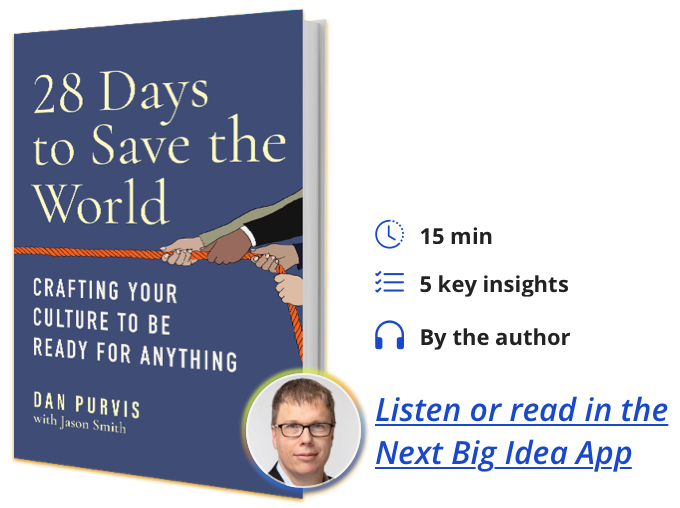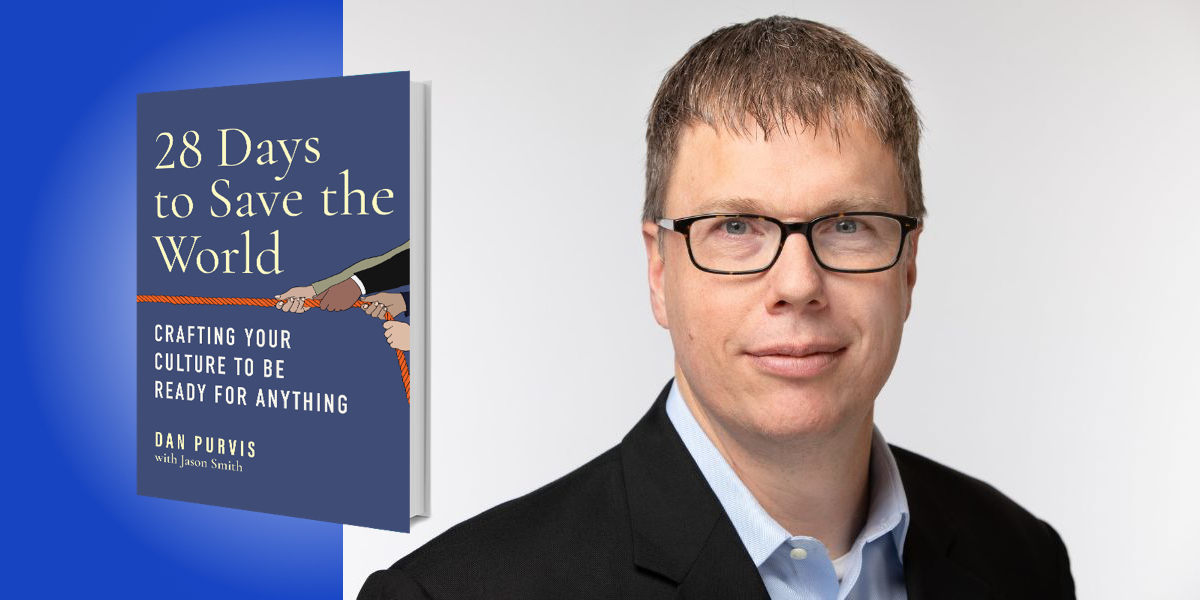Dan Purvis is an entrepreneur, electrical engineer and cofounder of engineering and manufacturing firm Velentium.
Jason Smith is the Senior Marketing Strategist at Velentium.
Below, co-authors Dan and Jason share 5 key insights from their new book, 28 Days to Save the World: Crafting Your Culture to Be Ready for Anything. Listen to the audio version—read by Dan himself—in the Next Big Idea App.

1. Volunteer yourself!
In March 2020, on a zoom call, our senior leadership team discussed how we were going to weather the COVID pandemic. To this day, the draft email, describing to our staff that we would try super hard to keep everyone, remains in my inbox.
It was in that moment that we heard from Ventec Life Systems, a small ventilator firm in the Seattle area. Ventec had stated in a national interview that they could build a lot more ventilators if they had the resources. Our firm had served Ventec for over half a decade. We knew them well, so we called up the CEO and asked to play a part.
A day later, on a call with Ventec’s COO, we learned of a daily strategy meeting every morning. That afternoon, after a flight on an empty plane, I made sure to be at the next strategy meeting in person. Two days later, General Motors executives were coming to Ventec, so I asked to be in the conference room. When we went around the room introducing ourselves, I made it clear that we were here and ready to help.
Over and over and over again, we placed ourselves in a position of action. We stepped in – and ultimately got to play a part in building 30,000 ventilators. We watched the project mentioned by the president on the White House lawn to the entire nation. It is easily the highlight of my career.
So, what is your moment? Are you in that moment right now? Has a moment passed you by and you can go back and take it? One thing is for sure, your next moment is coming you should seize it. Why NOT you? It should be you.
It all starts with the first step. If you aren’t sure you have what it takes to seize your moment, let me tell you a secret: those that win are not the smartest, they are the most stubborn. It is those who step up, who jump in, who run hard—and who never ever give up. So step in and make it happen! Volunteer yourself! Why not you?
2. Principles over rules.
Our passion at Velentium is to change lives for a better world. It starts with our staff, their families, and reaches all the way to the patients that receive the life changing medical devices that we design, develop, and manufacture. It touches our suppliers, clients, and community.
For community impact, a couple of Saturdays a year, our parking lot is turned into a bunk bed factory. Our partner, Sleep in Heavenly Peace, shows up with the lumber, hardware, tools, bedding, and the know-how. We show up with staff, family, friends, and loads of pizza and Dr. Pepper. Over the next four hours, we build 60 beds together.
“Principles will always produce more than rules.”
We then load those beds—complete with mattresses and linens—into our trucks and take them to families where their kiddos don’t have a place to sleep. It is amazing to see a kid jump on a bed that they can truly call their own. It feels revolutionary. My kids and our other staff families play a direct face-to-face part in changing lives.
One of my favorite pictures from a bed build is of our staff member, Matt. In the picture, he is watching his seven-year-old daughter sign her name on our event banner. It’s hard to tell who has more pride—Matt as he watched his daughter sign, or his daughter carefully wielding the sharpie! It’s a perfect picture of changing lives for a better world.
In the midst of Project V, our staff had to be willing to work 16+ hour days, indefinitely, seven days a week. We reminded ourselves that we exist to change lives for a better world—and that starts with us and our families. They were asked to give everything they could give. Our leaders couldn’t just be willing to work themselves, they had to be willing to require it of everyone on their teams.
And you know what? Everyone said yes! They all stepped in. It was because they had all already bought into our passion for changing lives. Long before project V ever started, Velentium’s first principal was changing lives for a better world. They were all deeply in tune with it.
Principles will always produce more than rules. If you find yourself making rules to keep bottom performers in line, stop. Principles confuse bottom performers, who want to be told step-by-step what to do and what not to do. They want rules that describe how much they can get away with. Principles inspire great performances from great people—the kind of people who will step up and work a crisis 16 hours, seven days a week, until it’s solved.
3. Be human.
Each evening at 5 P.M. during project V, there was a leader’s round table. Each of us could recount what was happening, where we were winning, where we were stuck. It was a metronomic daily moment in every week that broke up the work day between “normal” and “the next seven hours of work ahead.”
At the beginning of every one of those meetings, we started with a practice that surely drove some people crazy. It wasn’t efficient. It took some serious time in the midst of a project that didn’t have time to give. The following question was asked of the six of us: “tell me a story from the last day that proves you are human.”
Human stories connect us. They help us all know that we aren’t just output producers. Sometimes the stories were uplifting. Sometimes the stories were hard. I told one about my midnight basketball games in the driveway with my older sons followed by a burger from the nearby 24-hour Whataburger. Another was about losing my temper at a credit card customer service worker—not a moment to be proud of, but a human moment nonetheless.
“There is energy generated in any room and in any organization when the people in the room are interested—truly interested—in each other.”
Why do we feel like we need to check our humanness at the door to the office? It doesn’t make much sense. That person across the conference table is a person. Someone with hopes and dreams and fear and failures. That person changed a diaper this morning. That person watched a championship game from a lawn chair. That person buried a parent. That person volunteered all weekend for a great cause.
There is energy generated in any room and in any organization when the people in the room are interested—truly interested—in each other. So be interested! This can help your organization come alive with the energy of deeper relationships.
4. Reach simple.
Simple isn’t easy, but simple is worth it. Mark Twain said “I wrote you a long letter because I didn’t have the time to write you a short one.” There is a huge difference between truly simple and “almost there.” Reaching for simple pushes you to “go all the way to simple.” If you stop just short, you miss out on the huge benefits it can provide.
While initially brainstorming values at Velentium 10 years ago, leaders were asked to name all of the rock stars in their life—neighbors, relatives, co-workers, historical figures, athletes, Marvel characters, you name it. We wrote those names on a white board. We then asked the group “why is that name on there?” I wrote the trait next to each name as people described why they admired the person.
Then we erased the names and played a game we call kill/keep/combine with the list. We worked and worked until we got the list down to 12 traits. Arriving at simple isn’t easy but simple is worth it. I don’t know about you, but I can hardly remember a list of 12 things. What’s even tougher is how to know which one applies in a given situation. We had to make it simpler.
Meeting after meeting we banged our heads against the wall, and eventually narrowed it down to three traits: Honorable (we do right for right’s sake), results (we do the job and then some), humble charisma (we strive to be the kind of people you want to be around). Now our values are memorable, easily-applied, and highly versatile. Reaching simple will challenge you in many areas of life and business. You need to keep pressing in, to not settle, to demand more until you reach simple.
5. You decide.
My favorite two words at Velentium are “You Decide.” We work hard to assure that everyone in the organization has the ability, autonomy, and authority to make decisions. Staff will come to my office and ask me to weigh in. I start to smile and they can see it coming. They roll their eyes before exclaiming “Oh, c’mon, not, ‘You Decide!’ I want to know what you think!” My response is always the same: “I think that you will make a great decision”.
At our company, if you can justify your decision against our four principals (changing lives for a better world, honorable, results, and humble charisma), we will have your back. It makes leadership messier, as some people will make different calls than you would, but it also makes leadership easier, since you don’t always have to make all of the decisions. The mantra You Decide also creates a thinking culture.
“We work hard to assure that everyone in the organization has the ability, autonomy, and authority to make decisions.”
We adopted our two oldest sons internationally. As part of the dossier, I needed a letter from my bank stating that I had an account in good standing. I walked into “big box bank” and asked for the letter. I had no idea what the next 90 minutes of my life were going to entail.
For an hour and a half, I had to fight, persuade, argue, and push for a simple letter that said I had an account at the bank. It came down to one statement from the bank manager: “We don’t have an F-Key for that.”
In the big box bank branches, they were only authorized to push F-Keys and auto-generate forms. They had been trained not to think. Hence, they had no category for any client that came through their front door with something that couldn’t be F-Key’d. Ninety minutes later, I had finally convinced them to open up a document and copy their logo from the website and write me a letter saying I had an account. When the manager gave it to me, he told me with exasperation that he had just done me a huge favor.
That happened 18 years ago—and it still raises my blood pressure today. Build a thinking culture throughout your organization. It involves growing ability, authority, and autonomy in your staff. Once you implement “You Decide” you will never go back!
To listen to the audio version read by co-author Dan Purvis, download the Next Big Idea App today:































